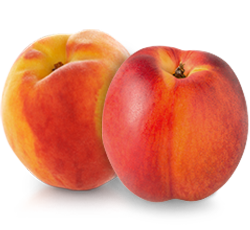peach News
The next big thing in Ontario fruit
August 21, 2017
There’s good news for people who love peaches, but hate that fuzzy texture.
by Owen Roberts Hamilton Spectator
.jpg)
Phil Tregunno, chair of the 250-member Ontario Tender Fruit Growers, are growing 750 acres of nectarines in the province this year. Tregunno is a fourth-generation fruit farmer. He farms outside Lincoln, Ontario. - Glenn Lowson/For Metro
Peach season has arrived, and what true blue Ontarian is not salivating for a basketful of this perfectly ripened tree fruit?
Well, for one, my friend Cort Egan. He has huge problems with peach fuzz.
"I love the taste of peaches," he says, "but I can't stand peach fuzz in my mouth. It makes my skin crawl. To me, it's like nails on a chalkboard."
Industry observers believe he's not alone.
"I've heard people say eating a peach is like eating a velour sweater," says veteran Toronto-based produce buyer and industry consultant Mike Mauti of Execulytics.
However, in Ontario, peaches are a legacy fruit. Peach season is a sign that summer has reached full maturity.
So, fuzz haters such as Egan are taking a different approach. More and more, they're patronizing peaches' smooth-skinned cousins, nectarines — so much so, that nectarines, which have been improved for better consumer acceptance, are being heralded as the next big thing in Ontario tender fruit.
Farmers such as Phil Tregunno, chair of the 250-member Ontario Tender Fruit Growers, are growing 300 hectares of nectarines in the province this year. That's about 15 per cent of all so-called tender fruit, comprising peaches, nectarines, plums, pears and apricots.
Tregunno, a fourth-generation fruit farmer, has nearly doubled his nectarine acreage this year. Other producers are doing the same; even though a newly planted tree takes up to four years to produce fruit, growers are confident consumers' ongoing zeal for local food will keep the buzz growing.
Tregunno says nectarines have come a long way since he started growing them a decade ago. Being relatively small, nectarines didn't have much curb appeal to consumers in grocery aisles.
And in the tender fruit world, size matters. Researchers at the University of Guelph, the Vineland Research Innovation Centre and elsewhere worked to create nectarines that have a sweet taste, cold tolerance and — most important, from a consumers' viewpoint — girth. Tregunno says thanks to new variety development, nectarines he now grows are about 25 per cent bigger than the ones he started with.
Consultant Mauti gets it. "Eye appeal is buy appeal," he says.
Unfortunately for nectarines, their eye appeal extends to insects. Like picky peach eater Egan, some insects are likewise repelled by a fuzzy coat. Nectarines and peaches often grow in the same orchards — Tregunno, for example, also grows 140 hectares of peaches — and that proximity makes nectarines a convenient choice for fuzz-hating bugs too.
Growers are also anticipating problems related to climate change. Tender fruit is delicate and highly susceptible to extra rain, cold, drought and heat from climate change.
"We're the canary in the coal mine," Tregunno says.
But when it comes to nectarines, it's worth it. Tregunno cites many cases where consumers have praised him for producing fresh tree-ripened tender fruit. Quality wise, it's superior in many ways to imports that have travelled thousands of miles and were picked unripe to endure the journey.
"Many people here have never had a fresh nectarine," Tregunno says. "When they do, they're thankful."
Nutritionists are nuts about nectarines
Ontario nectarines are low in calories and packed with nutrition, says Alison Duncan, a dietitian and human health and nutrition professor at the University of Guelph. Dietitians like nectarines because they're a source of vitamins C and A, potassium and dietary fibre, as well as lutein, which can improve eye health.
Preventing tender fruit spoilage naturally
Guelph researchers discovered a natural spoilage inhibitor called "hexanal" extends tender fruit shelf life up to 14 days. That's big news at home and abroad. Studies funded by Canada's International Development Research Centre show mangoes and bananas in India and Africa misted with hexanal stay fresh through their long journey to markets.
Source: https://www.thespec.com/news-story/7512501-the-next-big-thing-in-ontario-fruit/
Other News Stories
OCTOBER 10, 2024
Ontario’s Tree Fruit Growers’ Partnership with the Province to Bear Good Fruit [read more]
SEPTEMBER 12, 2022
Sustainable food production at the core of Ontario’s tender fruit orchards [read more]
JULY 11, 2022
Let Ontario’s fruit dazzle you with flavour and freshness this year! [read more]
APRIL 27, 2022
Making local tree fruit a number one choice for Ontario consumers [read more]
SEPTEMBER 23, 2021
85,000 New Trees and Vines Will Strengthen the Resilience of Niagara’s Tender Fruit Sector [read more]
AUGUST 17, 2020
Ontario eyes variety development for future grapes [read more]
MAY 24, 2016
Growers plant new varieties with investment from Greenbelt Foundation [read more]
OCTOBER 14, 2015
Pilot Project To Plant 130,000 Tender Fruit Trees In Niagara [read more]
MAY 15, 2015
The bloom is back and a little early [read more]
APRIL 01, 2015
Fruit Tracker | Fruit and Vegetable Magazine Article [read more]
JUNE 26, 2014
Local Food Week Was a Great Succes [read more]





